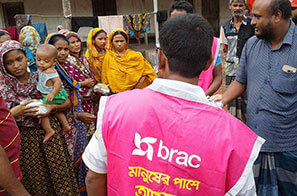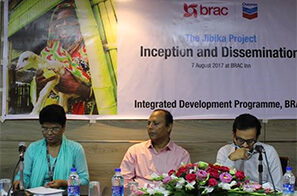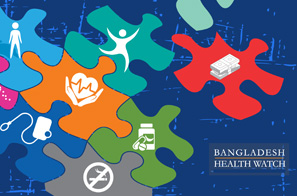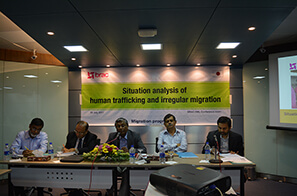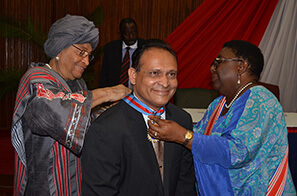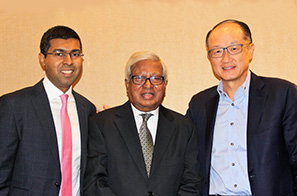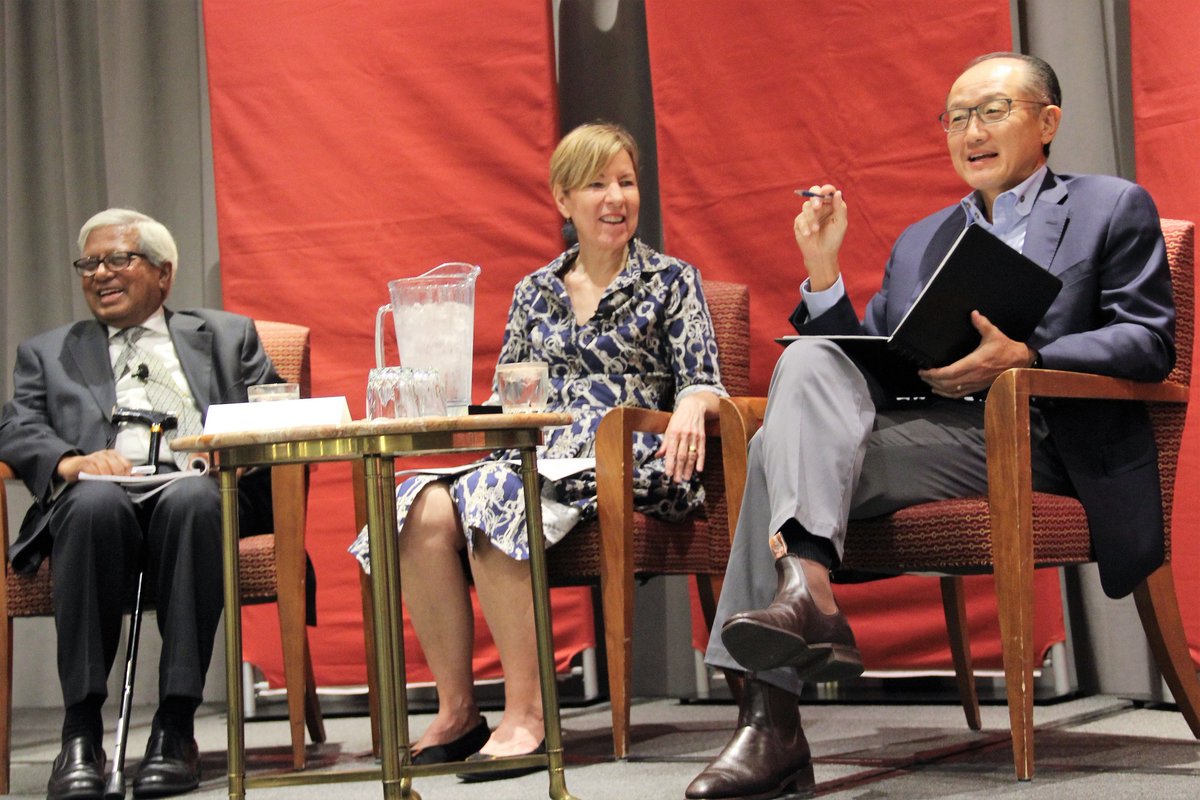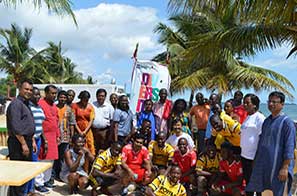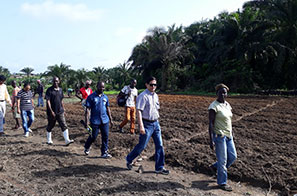
English (963)
Children categories
BRAC stands beside flood affected people
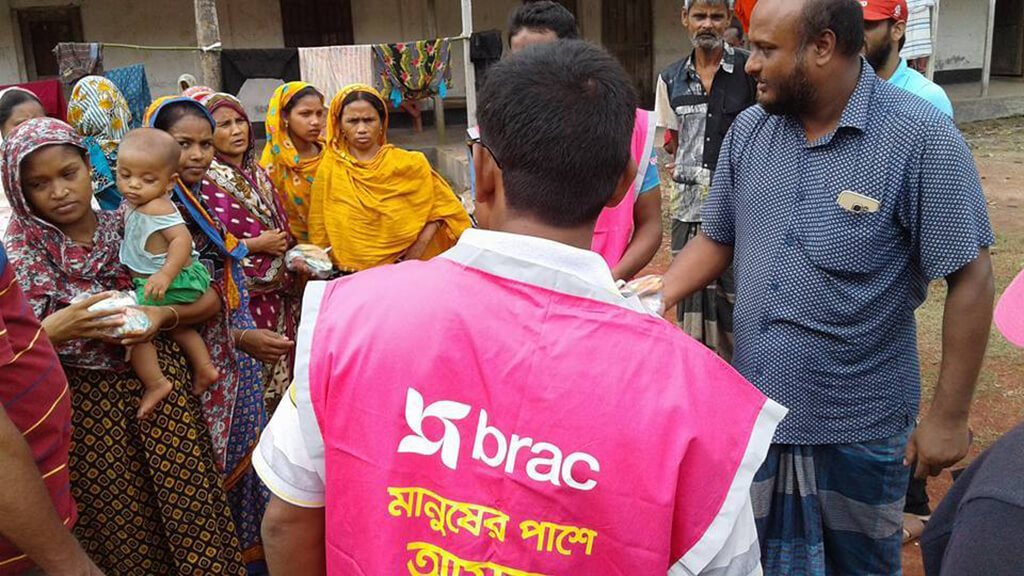
Development organisation BRAC is taking initiatives to help the flood affected communities across the country. Tk 50 thousand has been for each upazila to provide emergency assistance to flood victims. Dry food has been distributed to 22,500 flood victims in Thakurgaon upazila and food has been distributed to 3500 people of Debiganj upazila of Panchagarh.
BRAC is taking its initiatives in coordination with the government departments concerned. The assistance will be continued by BRAC’s Disaster Management and Climate Change (DMCC) programme until the situation adequately improves. The DMCC has already instructed its staff to make necessary expenses to provide assistance to the flood affected people from its relief budget.
BRAC has already undertaken an emergency awareness campaign in the flood affected localities about shifting the women and children to safe shelters from road, railway land and riverbank area where they have taken emergency refuge, safe food supply, use of sanitary latrine and other important public health and safety issues.
According to the flood forecast and warning messages, in the next 10 days districts where flood situation may worsen include Kurigram, Gaibandha, Bogra, Jamalpur, Sirajganj, Tangail, Manikganj, Faridpur, Shariatpur, Chandpur, Rajbari, Chapai Nawabganj and Rajshahi.
BRAC staff has been instructed to provide assistance to the affected people in these districts.
The Jibika project: Dissemination and inception
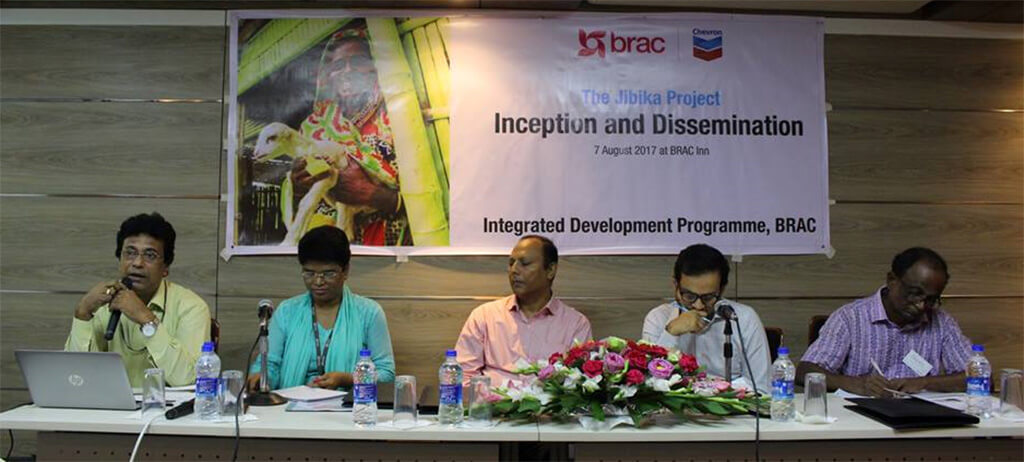
The Jibika project is a collaborative initiative by BRAC and Chevron to improve sustainable livelihoods and social development of vibrant communities around gas fields operated by Chevron Bangladesh in the greater Sylhet region.
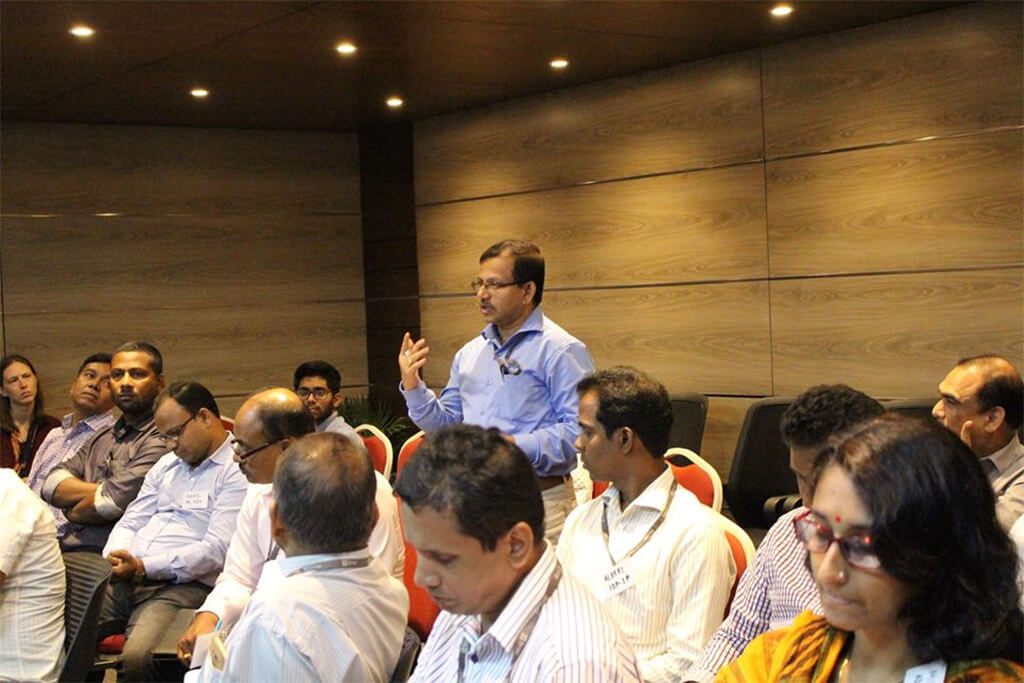 A session on 'Dissemination and inception' of Jibika project was organised at BRAC's conference room yesterday. It was chaired by Anna Minj, Director of Community Empowerment, Gender Justice and Diversity, and Integrated Development Prgramme of BRAC. Shyam Sundar Saha, Programme Head of IDP presented the glimpse of Jibika pilot phase and also shared the key areas for further development. Naser Ahmed, Director, External Affairs, Chevron Bangladesh, appreciated both BRAC and IDEA’s efforts for implementing such a challenging project successfully.
A session on 'Dissemination and inception' of Jibika project was organised at BRAC's conference room yesterday. It was chaired by Anna Minj, Director of Community Empowerment, Gender Justice and Diversity, and Integrated Development Prgramme of BRAC. Shyam Sundar Saha, Programme Head of IDP presented the glimpse of Jibika pilot phase and also shared the key areas for further development. Naser Ahmed, Director, External Affairs, Chevron Bangladesh, appreciated both BRAC and IDEA’s efforts for implementing such a challenging project successfully.
As special guest, Asif Saleh, Senior Director, Strategy, Communication and Empowerment of BRAC explained the reason why BRAC engaged itself with corporate agencies. He said, 'development is not a T20 game; it's all about long-term game which requires time to make behavioral changes. The development agencies like BRAC is expecting more corporate engagement with those who are getting involved in development initiatives with their CSR funds.'
Nazmul Haque, Executive Director of IDEA (Implementing partner of Jibika) delivered the concluding remarks with vote of thanks.
Bangladesh Health Watch Report 2016 launched
Non-communicable disease control major challenge
Lack of service for women and children
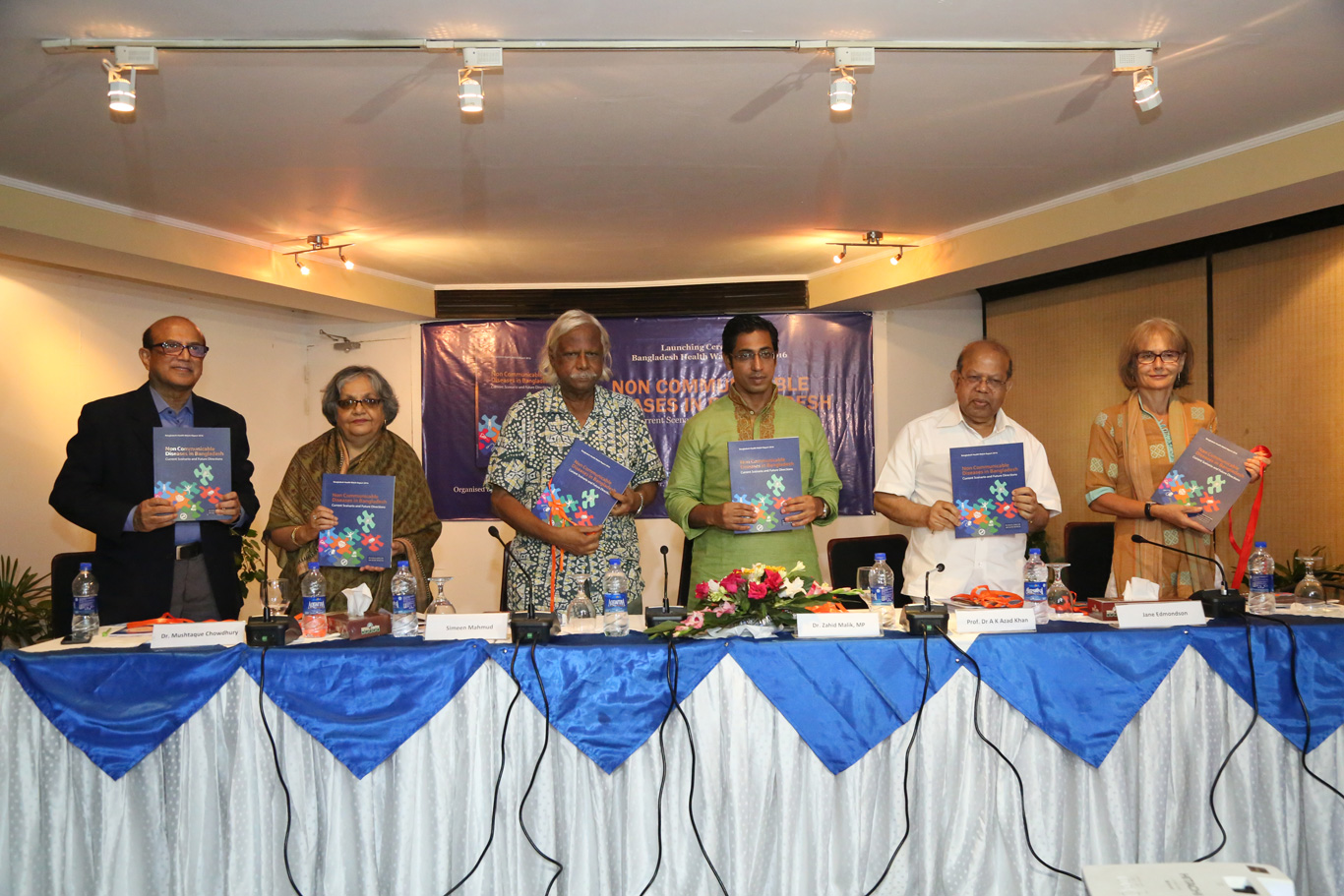
Inadequacies in non-communicable disease control measures pose a major threat in the country’s health sector despite other commendable achievements in improving the healthcare services. Particularly, there is a serious shortage in healthcare services in this regard for women and children. Insufficient infrastructure and lack of preparedness to meet the patient demands are also part of the scenario.
Speakers discussed these issues at the launch ceremony of the sixth Bangladesh Health Watch Report 2016 today on Thursday (10 August 2017) at the BRAC Centre Auditorium in the capital.
The event titled ‘Non-Communicable Diseases in Bangladesh: Current Scenario and Future Directions’ had Nahin Razzaq MP, member of the parliament standing committee on youth and sports ministry, as its chief guest.
Simeen Mahmud, head (acting) of Gender Studied Cluster, and coordinator of Centre for Gender and Social Transformation, Bangladesh Institute of Governance and Development, BRAC University, chaired the programme.
Gonoshasthaya Kendra founder Dr Zafrullah Chowdhury, Jane Edmondson, Dhaka Office head of United Kingdom’s Department for International Development, and Anders Ohstrom, head of Swedish International Development Cooperation Agency, spoke among others at the event.
Dr Ahmed Mushtaque Raza Chowdhury, vice-chairman of BRAC, gave the welcome address.
Nahin Razzaq MP said, ‘With the increased prevalence of non-communicable diseases the government has started investing in this area. We are going to formulate an action plan on next month. We have also increased emphasis on young people’s engagement in sports and cultural activities.’
Dr Zafrullah Chowdhury said, ‘Although the government is implementing many commendable programmes, due only to some wrong policies non-communicable diseases is heading towards a crisis situation. The organ transplant law that the government has recently enacted is not practical. I believe, the government could have the law formulated with directions that allowed not only close relatives but anyone to donate kidney.’
The report presented data and analysis on the nature and risk factors regarding the non-communicable diseases in Bangladesh. The challenges highlighted in the report among others include: One, Mainstreaming non-communicable disease service provision at the primary healthcare level, two, Non-functioning regulatory framework and lack of coordination at the national level and three, lack of robust national database incorporating data from rural and urban areas as well as public and private sources for regular and strong surveillance of such diseases.
To mitigate the challenges the report has put forward five challenges:
- Build awareness across the society about the urgency of tackling non-communicable diseases and its consequential impact on poverty alleviation, economic development and achieving the universal healthcare policy.
- Develop an integrated, multi-sector approach to prevent and manage non-communicable diseases with the health and family welfare ministry in the lead.
- Strengthen the current health systems at all levels to address non-communicable diseases, focusing on human and physical capacity of the primary healthcare services for early diagnosis and treatment, follow-up services and disease risk reduction.
- Establish a comprehensive national-level surveillance system for the four major non-communicable diseases.
- Generate evidence for preventive and curative service delivery regarding non-communicable diseases effectively and efficiently, keeping equity and universal coverage in focus.
- The report also stressed that a ‘concerted, strategic, and multi-sectoral policy approach’ is essential to tackle the emerging epidemic of non-communicable diseases in Bangladesh.
Situation analysis of human trafficking and irregular migration

Bangladesh in image crisis for human trafficking and irregular migration to Europe in sea routes
Trafficking godfathers must be caught: NHRC chair
Bangladesh is now among the top countries of origin for illegal immigrants in Europe. In the first six months of the current year (2017), 7,899 illegal Bangladeshi migrants entered Europe through the Mediterranean Sea route only, according to Frontex, an organisation of European Council working to coordinate between the border security forces of European Union member countries.
Speakers revealed this information at a consultation meeting today on Saturday (29 July 2017) at BRAC Centre Inn. Development organisation BRAC organised the event titled 'Situation analysis of illegal trafficking and irregular migration' on the occasion of World Day against Trafficking in Persons.
Kazi Reazul Hoque, chairman, National Human Rights Commission Bangladesh, was present at the programme as the chief guest.
Chaired and moderated by Asif Saleh, senior director, strategy, communication and empowerment, BRAC and BRAC International, the event was also attended, among others, by Jabed Ahmed, additional secretary, expatriates welfare and oversees employment ministry, C R Abrar, professor, International Relations, Dhaka University, also coordinator of Refugee and Migratory Movements Research Unit (RMMRU), and Shah Alam, Additional Deputy Inspector General of CID. Representatives of different development organisations, senior police officers and senior journalists were also present at the meeting.
Md Shariful Hasan, programme head, BRAC Migration Programme, presented the keynote article at the event. Analysing the situation from different angles he said that there is no definite statistics about the exact number of Bangladeshis currently staying illegally in Europe. However, a European Union delegation during their Dhaka visit in this April stated that around 80 thousand illegal Bangladeshi migrants are currently stating in Europe. The European Commission statistics office Eurostat states that in 2008-2015 period 93,435 Bangladeshis were staying illegally in the European countries. This number should cross 100 thousand if the account of the first six years of current year is added to 2008-2015 account.
NHRC chair Kazi Reazul Hoque at the programme said, 'It is true that we have an excellent law formulated in 2012. About the same time law was passed against money laundering. But certainly question is there about the extent of their proper implementation.'
'According to the police, only 30 convicts have been given life imprisonment so far out of 3500 human trafficking cases,' he further said, observing pointing out a number of weaknesses in the present manner of dealing with such cases. 'Many times the court does not have anything to do against the perpetrators because the police give flawed reports.' 'No matter how the incidents took place it is our responsibility to protect human rights,' the NHRC chair stressed, 'the state must take responsibility'. He suggested that the government may undertake making a shortlist of 25 top 'godfathers' to chase and nab them.
Professor C R Abrar said, 'We must keep in mind that the human traffickers in both country and abroad are a highly powerful coterie. We have to be have sufficient preparation to bring them to book.'
Expatriate welfare additional secretary Jabed Ahmed said, 'Reducing the cost of migration is still the biggest challenge. When someone migrates spending an excess amount of money, in the urge of recovering that expenses many times they become irregular.'
He stressed on strong coordination among the home ministry, foreign affairs ministry, commercial aviation and other relevant ministries to prevent human trafficking.
BRAC senior director Asif Saleh presented the recommendations of the consultation meeting, saying 'We should focus on four main issues to prevent human trafficking: Ensuring accountability of the law enforcement agencies, utrilising the mass media to raise mass awareness, ensuring follow-up of legal cases and ensuring strong coordinator among the relevant ministries.'
Expatriates welfare and oversees employment ministry's deputy chief K M Ali Reza, development practitioner Asif Munir, additional police super of anti-human trafficking cell of Bangladesh Police Masura Begum, and Rapid Action Battalion deputy director Abdullah Al Maruf also spoke among others.
Speakers also told the meeting that in the early July this year around 2,000 illegally travelling Bangladeshis have become stuck in Turkey en route to Europe. The scenario becomes even bleaker when the illegal travel to Malaysia and Thailand through dangerous sea routes and the mass graves recently discovered in those countries are considered. Malaysia has already started its operation against illegal immigrants, while Saudi Arabia is taking its preparation. According to the expatriates welfare and oversees employment ministry, around 800 thousand (8 lakh) Bangladeshi migrants returned for lacking legal documents.
The speakers further said Bangladesh's status in the annual report of the US foreign affairs ministry published this has gone one step down. In this report the relevant countries are divided in three tiers. In last five years Bangladesh was in Tier-2, while this year it has been positioned one step down to Tier-2-Watch List along with 45 other countries including Saudi Arabia, Algeria, Pakistan, Thailand and Hong Kong. This scenario is a really worrying one particularly at this juncture when Bangladesh is poised for upgrading itself to a middle-income country and aspires to establish a strong safe migration process.
Referring to International refugee Organisation, the speakers said in last ten years around 150 thousand Bangladeshis have been the victim of illegal trafficking through Bay of Bengal routes. Of then at least 1500 died in the sea. Of the over 200 dead bodies recovered from the mass graves of Malaysia and Thailand, many were of Bangladeshi citizens. According to the information from the Bangladesh foreign affairs ministry and International Organisation for Migration (IOM), the government returned 2,183 Bangladeshis, of whom 183 are children. According to the police headquarters, since the Prevention and Suppression of Human Trafficking Act, 2012 was passed around 3500 cases were filed. But the victims complain that most of these cases are seriously delayed.
BRAC in Liberia honoured by Her Excellency President Sirleaf
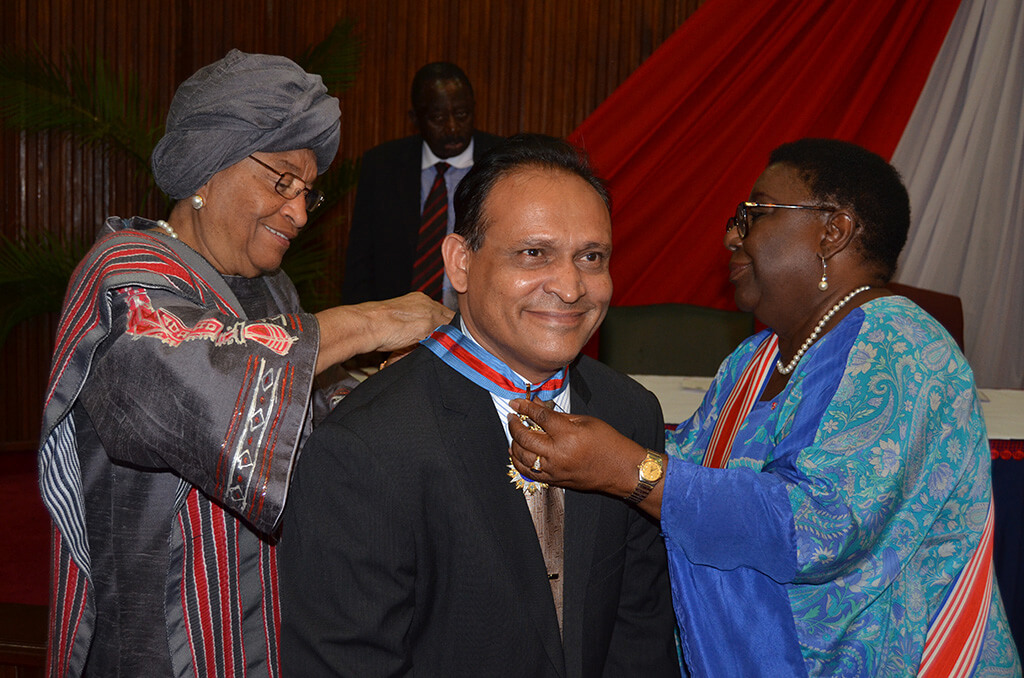 Country Representative of BRAC in Liberia receiving the medal from Her Excellency President Sirleaf
Country Representative of BRAC in Liberia receiving the medal from Her Excellency President Sirleaf
BRAC in Liberia was honoured by the President of Liberia, Her Excellency Mrs. Ellen Johnson Sirleaf, during the celebrations marking the 170th Anniversary of the independence of Liberia. The investiture ceremony took place on 25 July, 2017 at the C. Cecil Dennis, Jr. Auditorium in the Ministry of Foreign Affairs in Monrovia.
President Sirleaf, herself the Grand Master of the Order of Distinction of the Republic of Liberia, admitted BRAC into the Humane Order of Africa Redemption and conferred the Grade of “Knight Commander” in consideration of the contributions of BRAC to alleviate poverty in Liberia. Mainuddin Ahmed, the Country Representative of BRAC in Liberia, received the medal on behalf of BRAC.
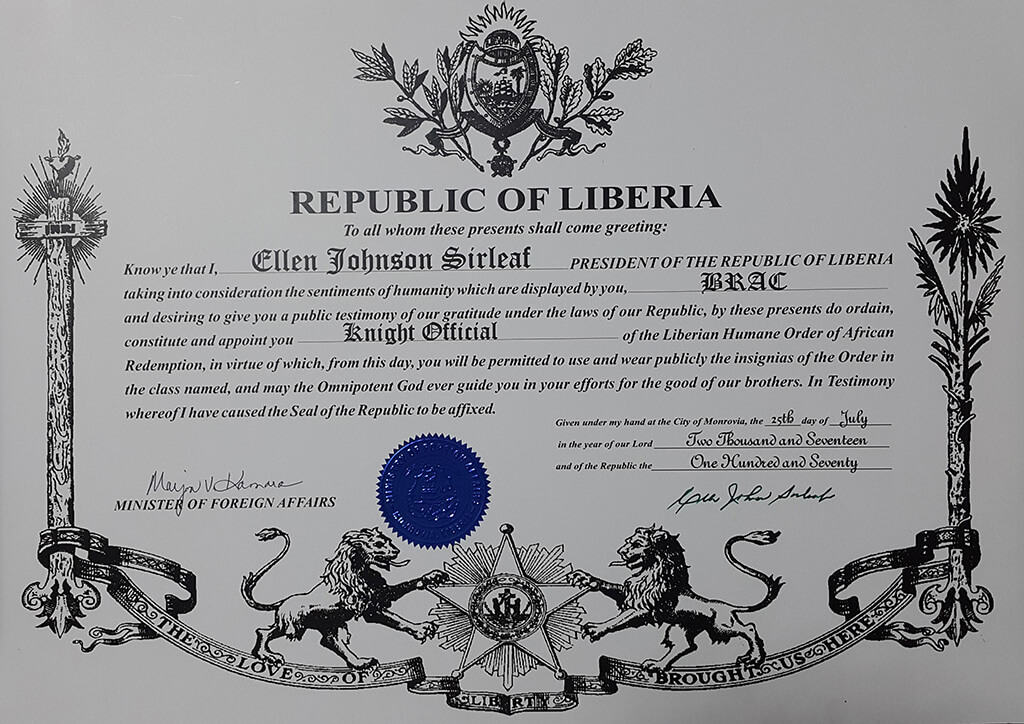 The Knight Order Certification for BRAC in Liberia
The Knight Order Certification for BRAC in Liberia
The President recognised and publicly appreciated BRAC’s contributions to the socio-economic development of Liberia through multi-sectoral programmes which have spurred economic recovery and growth over the past ten years.
"If we can get people to the Moon, we can end poverty at home"
Dr Jim Kim and international development community hail BRAC as a global leader in ending extreme poverty
On Sunday, 23 July 2017, Sir Fazle Hasan Abed, founder and chairperson, BRAC shared the stage with Dr Jim Yong Kim, president of the World Bank Group at the annual RESULTS International Conference held in Washington, DC.
At the plenary titled Going the Last Mile, Dr Joanne Carter, executive director of RESULTS and RESULTS Educational Fund, recognised Sir Fazle and Dr Kim as two global leaders and practical visionaries who did “what the world had said was too hard or even impossible”, played a critical role in fighting tuberculosis, and had what it will take to get to the last mile in ending extreme poverty.
"One of the great tragedies is that not enough people in the world know about @BRACworld ". #Voices4RESULTS plenary session @WorldBank
— RESULTS Australia (@RESULTS_AU) July 23, 2017
Sir Fazle talked about the motivation behind BRAC’s globally successful graduation programme; reaching those trapped in ultra poverty.
'[Sir Abed has demonstrated that] there is no such thing as a hopeless person or a hopeless country' - @WorldBank President #Voices4RESULTS
— BRAC (@BRACworld) July 23, 2017
Dr Kim emphasised the need for governments today to invest in their own people and move away from supply-driven investments to demand-driven investments.
Both Sir Abed and Dr Kim highlighted the role that women can play in fighting poverty, and the need to mobilise them as ‘agents of change’ for poverty alleviation.
"If women manage poverty why can't they manage development? We see women as the main agents of change"- Sir FH Abed #Voices4RESULTS
— BRAC (@BRACworld) July 23, 2017
In his closing remarks, Dr Kim expressed his concern of rising aspirations everywhere;
“We are racing against time and the sense of urgency we have today is greater than it was ever before,” he said. “We have to get better at thinking about the foundations of human solidarity. We have to find a way forward. We have to commit and recommit to equality of opportunity,” he concluded.
Good to meet with Sir Fazle Abed of @BRACworld. I look forward to continuing our strong partnership. pic.twitter.com/wEDxST1Ec4
— Jim Yong Kim (@JimYongKim) July 23, 2017
Representatives from BRAC presented the details of their graduation programme in a separate panel with panellists from the University of New Hampshire, Uplift and the RESULTS Educational Fund. This session provided the opportunity to understand the various forms of social protection and livelihood programmes and the need to make such programmes more comprehensive, adaptive and scalable in order to reach the extreme poor and provide them with better support to help escape poverty sustainably.
Fazle Hasan Abed: architect of poverty reduction
He holds the number 37 position on Fortune’s List of the World’s 50 Greatest Leaders and has won an incredible number of prestigious awards. He is the founder and chairperson of the world’s largest private development aid organisation, with 100,000 employees in 11 countries and a budget of one billion dollars. He is 81 years old, and his biography reads like an adventure novel. After 45 years, the ongoing success of his NGO called BRAC offers a convincing response to those cynics who declared development aid a thing of the past. His name is Sir Fazle Hasan Abed and De Dikke Blauwe spoke to this architect of poverty reduction during his visit to the Netherlands in mid-June. read more
BRAC Trains 20 in Nutritional Health in Liberia
This article was published in the Daily Observer, Liberia on 1 June 2017
BRAC Liberia recently concluded a two-day nutrition training for twenty (20) leaders in the health and agriculture sectors of six counties, including Montserrado, Grand Bassa, Margibi, Bong, Bomi, and Cape Mount.
The training was held in Kingsville, Careysburg district, Montserrado County.
According to BRAC-Liberia the training focused on breastfeeding, complementary breastfeeding, malnutrition prevention, and vitamin A deficiencies.
Facia Goah, nutrition focus person for Montserrado County at the Ministry of Health, appreciated BRAC for involving community organizations in the fight against malnutrition.
She added that diet diversification is one of the major challenges to reducing malnutrition in the country.
"Our people are used to eating one kind of food, and parents are encouraging children to eat the same food. However, encouraging people to eat varieties comes with huge collaboration," she said.
Celebrating diversity in Sierra Leone
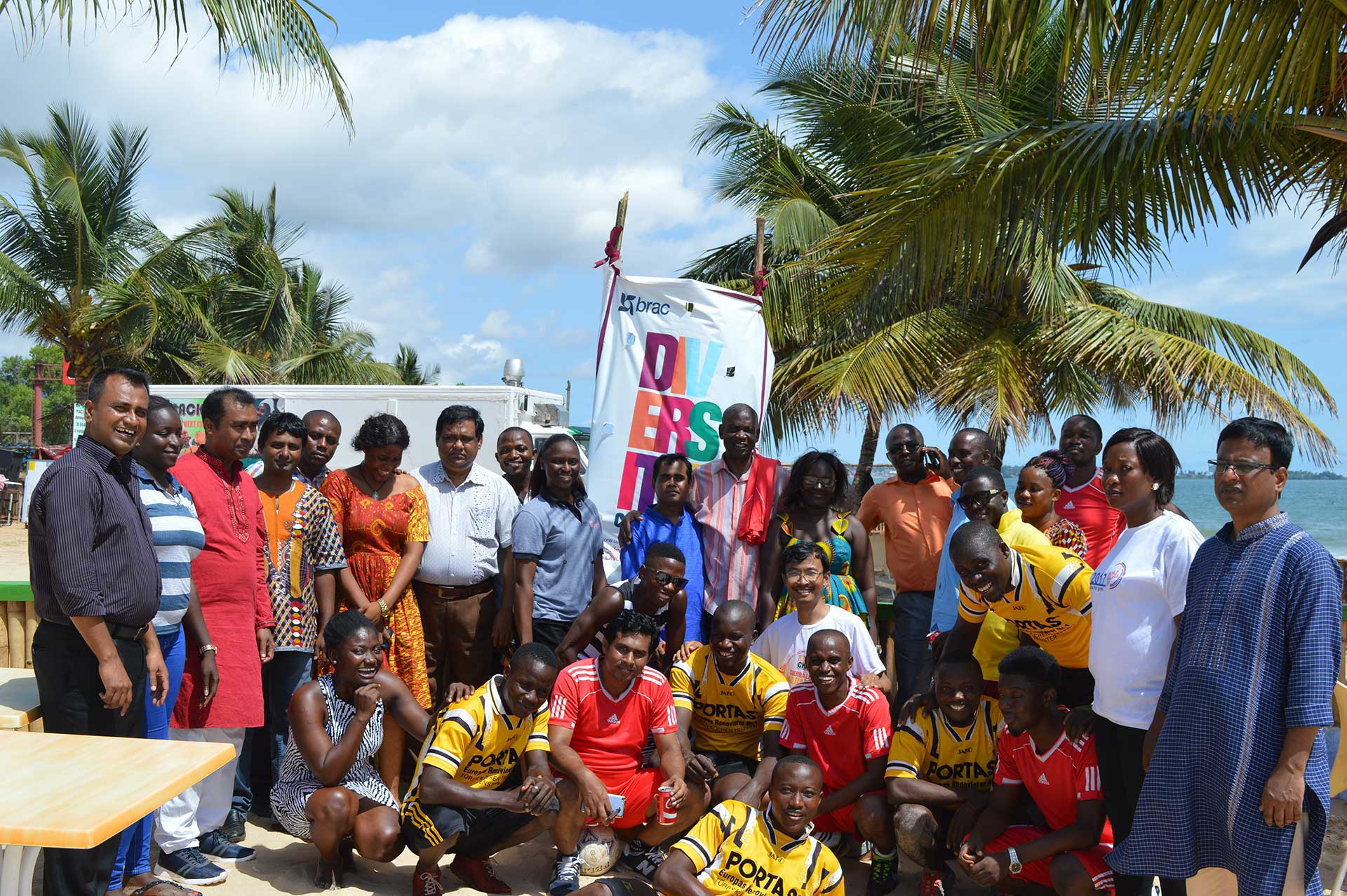 BRAC in Sierra Leone celebrating diversity
BRAC in Sierra Leone celebrating diversity
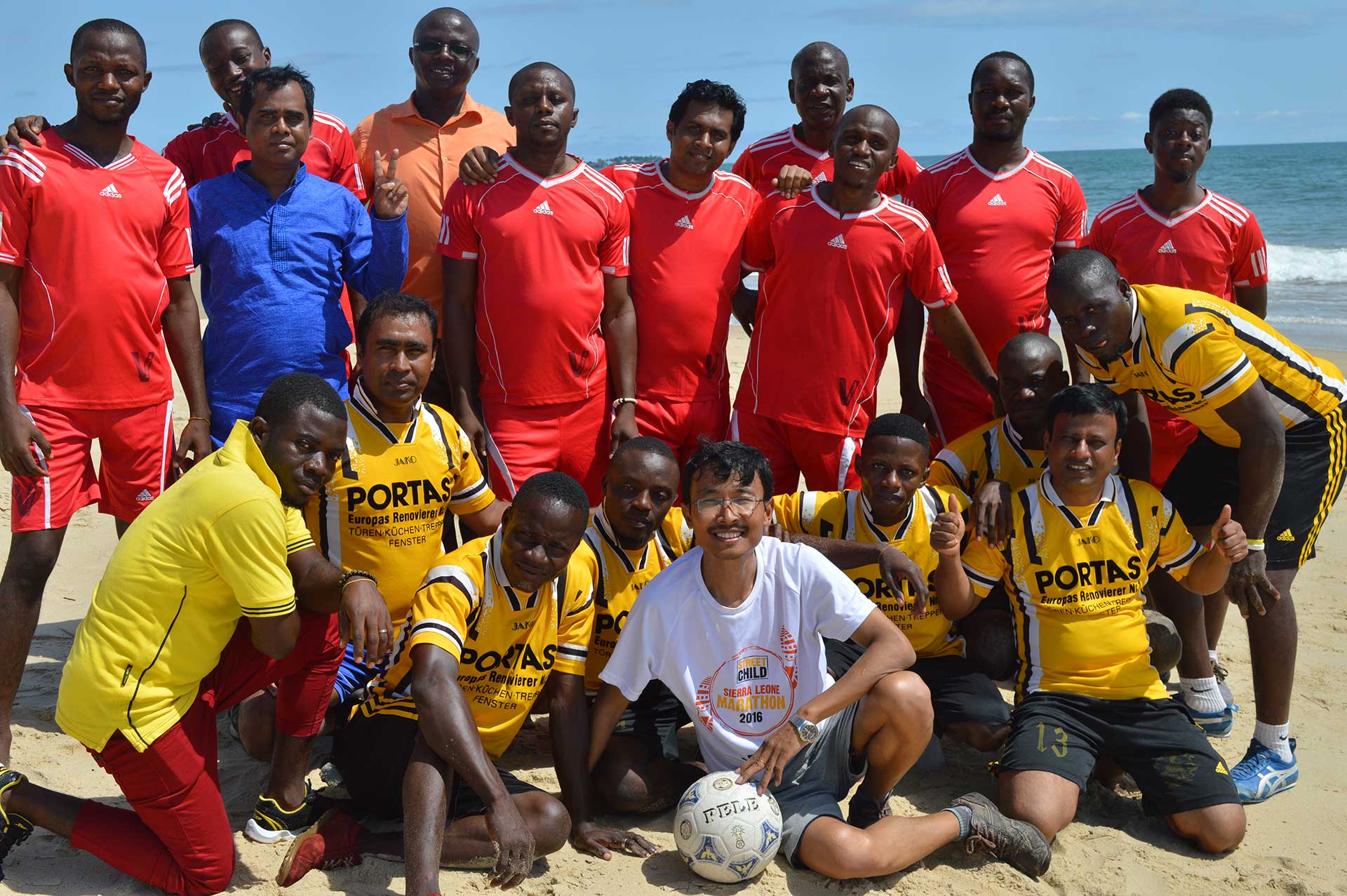 BRAC in Sierra Leone football team on Diversity Day
BRAC in Sierra Leone football team on Diversity Day
BRAC in Sierra Leone celebrated the World Day for Cultural Diversity for Dialogue and Development across the country. All area offices, branch offices and the country office got involved for the occasion.
The country office celebrated the day at the famous Aberdeen/Lumley Beach with cultural events, food, and sports and games. Representatives from each ethnic group in our offices talked about their cultural practices, norms and values of their respective tribes, followed by music and dancing.
The staff partook in various sports and games afterwards, including football, volleyball, musical chairs, Ludo and more.
BRAC International executive director’s visit to Liberia
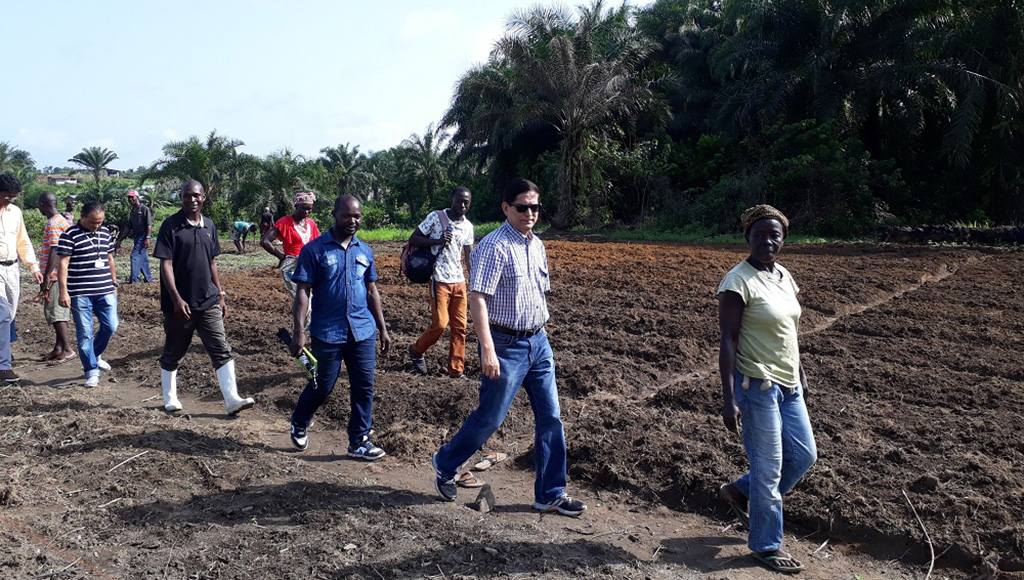 BI ED visit Cash for work (CFW) site at Airport branch
BI ED visit Cash for work (CFW) site at Airport branch
The executive director for BRAC International, Mr Faruque Ahmed visited BRAC in Liberia from May 9, 2017 to May 12, 2017. During this time, he visited several project sites and met with some of the beneficiaries and staffs of the programmes, including microfinance, early childhood development and cash for work.
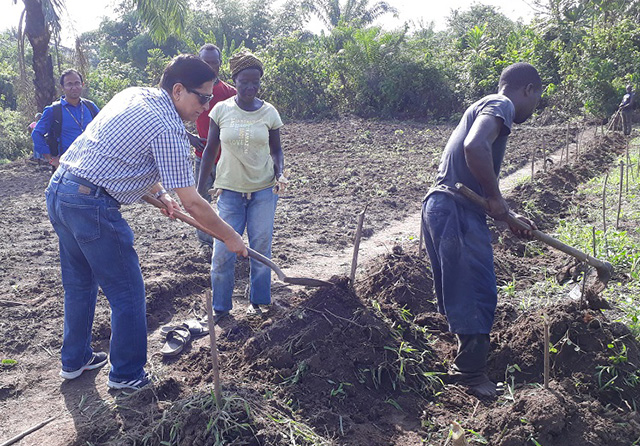 BRAC Int.l Executive Director demonstrate mount preparation for Cassava
BRAC Int.l Executive Director demonstrate mount preparation for Cassava
Mr Ahmed met with Her Excellency President Ellen Johnson Sirleaf to discuss how BRAC can provide a platform for the Government to achieve their goals. He also held meetings with various other Government officials and donors in the trip, including the Minister of State for Presidential Affair Mr Slyvester M. Grigsby, the Minister of Agriculture and the Ambassador and Delegates of European Union to Liberia.
Mr Ahmed concluded the trip by spending time with the team in Liberia and engaging in some lively discussions with the staff.
Join the world’s biggest family

